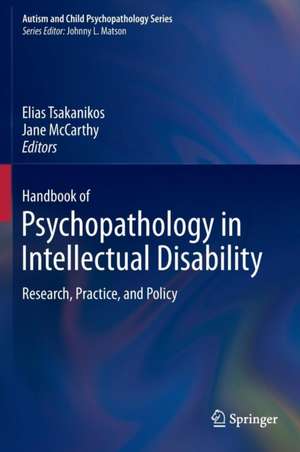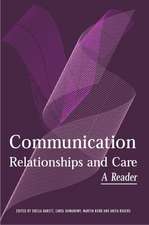Handbook of Psychopathology in Intellectual Disability: Research, Practice, and Policy: Autism and Child Psychopathology Series
Editat de Elias Tsakanikos, Jane McCarthyen Limba Engleză Hardback – 2 oct 2013
The Handbook of Psychopathology in Intellectual Disability reflects the diversity of its subject in prevalence and presentation, testing methods and treatment options. Besides focusing on specific pathologies as they affect the course of intellectual disability (ID), its coverage spans the field from in-depth analyses of psychosocial aspects of ID to promising new findings in genetics and the ongoing challenge of providing personalized care tailored to individual client needs. Expert contributors bridge gaps between the evidence base and best practices and improved policy for maximum utility. In addition, chapters are written to benefit the widest variety of professionals treating clients with ID across disciplines.
Key areas featured in the Handbook include:
- General issues and assessment methods.
- Core etiological approaches, including neuroimaging.
- Comorbid psychopathology, including mood, anxiety, and personality disorders.
- Common clinical conditions, such as ADHD, autism, and behavior problems.
- Medical and psychological interventions as well as community and inpatient services.
- Future directions in research and evidence-based practices.
| Toate formatele și edițiile | Preț | Express |
|---|---|---|
| Paperback (1) | 2873.18 lei 6-8 săpt. | |
| Springer – 23 aug 2016 | 2873.18 lei 6-8 săpt. | |
| Hardback (1) | 2881.77 lei 3-5 săpt. | |
| Springer – 2 oct 2013 | 2881.77 lei 3-5 săpt. |
Din seria Autism and Child Psychopathology Series
- 18%
 Preț: 688.59 lei
Preț: 688.59 lei - 24%
 Preț: 1087.50 lei
Preț: 1087.50 lei - 18%
 Preț: 1129.20 lei
Preț: 1129.20 lei - 20%
 Preț: 567.37 lei
Preț: 567.37 lei - 18%
 Preț: 1567.52 lei
Preț: 1567.52 lei - 15%
 Preț: 499.59 lei
Preț: 499.59 lei - 18%
 Preț: 954.77 lei
Preț: 954.77 lei - 18%
 Preț: 1672.16 lei
Preț: 1672.16 lei - 18%
 Preț: 1566.23 lei
Preț: 1566.23 lei - 15%
 Preț: 635.65 lei
Preț: 635.65 lei - 18%
 Preț: 2513.63 lei
Preț: 2513.63 lei - 18%
 Preț: 2111.59 lei
Preț: 2111.59 lei - 18%
 Preț: 1669.79 lei
Preț: 1669.79 lei - 15%
 Preț: 644.30 lei
Preț: 644.30 lei - 15%
 Preț: 520.61 lei
Preț: 520.61 lei - 18%
 Preț: 1836.63 lei
Preț: 1836.63 lei - 18%
 Preț: 1565.61 lei
Preț: 1565.61 lei - 15%
 Preț: 645.28 lei
Preț: 645.28 lei - 15%
 Preț: 703.52 lei
Preț: 703.52 lei - 18%
 Preț: 727.80 lei
Preț: 727.80 lei - 24%
 Preț: 949.94 lei
Preț: 949.94 lei - 18%
 Preț: 1233.20 lei
Preț: 1233.20 lei - 15%
 Preț: 642.51 lei
Preț: 642.51 lei - 18%
 Preț: 1114.83 lei
Preț: 1114.83 lei - 18%
 Preț: 2984.58 lei
Preț: 2984.58 lei - 18%
 Preț: 1210.30 lei
Preț: 1210.30 lei - 24%
 Preț: 681.25 lei
Preț: 681.25 lei - 20%
 Preț: 585.05 lei
Preț: 585.05 lei - 18%
 Preț: 2531.30 lei
Preț: 2531.30 lei - 18%
 Preț: 1676.58 lei
Preț: 1676.58 lei
Preț: 2881.77 lei
Preț vechi: 3033.44 lei
-5% Nou
Puncte Express: 4323
Preț estimativ în valută:
551.41€ • 577.36$ • 457.37£
551.41€ • 577.36$ • 457.37£
Carte disponibilă
Livrare economică 19 martie-02 aprilie
Preluare comenzi: 021 569.72.76
Specificații
ISBN-13: 9781461482499
ISBN-10: 1461482496
Pagini: 420
Ilustrații: XI, 405 p. 3 illus.
Dimensiuni: 178 x 254 x 27 mm
Greutate: 0.94 kg
Ediția:2014
Editura: Springer
Colecția Springer
Seria Autism and Child Psychopathology Series
Locul publicării:New York, NY, United States
ISBN-10: 1461482496
Pagini: 420
Ilustrații: XI, 405 p. 3 illus.
Dimensiuni: 178 x 254 x 27 mm
Greutate: 0.94 kg
Ediția:2014
Editura: Springer
Colecția Springer
Seria Autism and Child Psychopathology Series
Locul publicării:New York, NY, United States
Public țintă
ResearchCuprins
Section 1. General Issues & Assessment of Psychopathology.- Chapter1. Introduction.- Chapter 2. Epidemiology.- Chapter 3. Principles of Clinical Assessment.- Chapter 4. Assessment Instruments.- Chapter 5. Classification and Diagnostic Systems.- Section 2. Aetiological Approaches.- Chapter 6. Neuroimaging.- Chapter 7. Epilepsy.- Chapter 8. Behavioural Phenotypes/Genetic Syndromes.- Chapter 9. Psychological and Social Factors.- Section 3. Co-morbid Psychopathology.- Chapter 10. Schizophrenia Spectrum Disorders.- Chapter 11. Mood & Anxiety Disorders.- Chapter 12. Personality Disorders.- Chapter 13. Dementia.- Chapter 14. Substance Misuse.- Section 4. Common Clinical Conditions.- Chapter 15. Attention Deficit Hyperactivity Disorder (ADHD).- Chapter 16. Autism Spectrum Disorders.- Chapter 17. Behaviour Problems & Psychopathology.- Chapter 18. Forensic & Offending Behaviours.- Section 5. Interventions and Services.- Chapter 19. Psychopharmacology.- Chapter 20. Psychological Treatments.- Chapter 21. Community Mental Health Services.- Chapter 22. Impatient Mental Health Services.- Section 6. Future Directions.- Chapter 23. Psychopathology in Intellectual Disability: Future Directions in Research and Evidence-Based Practice.
Notă biografică
Elias Tsakanikos, Ph.D., has a background in academic psychology and one main stream of his current research focuses on co-morbid psychopathology in adults with Autism Spectrum Disorder and Intellectual Disabilities. He is a Reader in Psychology, a Chartered Psychologist, an Associate Fellow of the British Psychological Society (BPS), an Honorary Senior Research Fellow at the Institute of Psychiatry, King's College London, a member of the British Society for the Study of Individual Differences (BSPID), the International Society for the Study of Individual Differences (ISSID) and a Fellow of the Royal Society for Public Health (RSPH). He is member of various Εditorial boards including Research in Developmental Disabilities, Advances in Mental Health and Intellectual Disabilities, Mental Health Research in Intellectual Disabilities, Journal of Experimental Psychiatry and Behavior Therapy, and Review Journal of Autism and Developmental Disorders.
Jane McCarthy, M.D., has worked for many years as a psychiatrist in services for children and adults with intellectual disability with a very strong emphasis on evidence-based practice. She is Chair of Challenging Behaviour & Mental Health Special Interest Research Group of International Association for the Scientific Study of Intellectual and Developmental Disabilities, member of Executive Committee of Section of Psychiatry of Intellectual Disability of World Psychiatric Association, a Fellow of Royal College of Psychiatrists and Vice Chair of Intellectual Disability Faculty of Royal College of Psychiatrists, UK. Dr McCarthy is also the secretary to European Association in Mental Health in Intellectual Disability and until recently co-editor of the Advances in Mental Health and Intellectual Disabilities. Her main areas of research are mental health needs of people with intellectual disability and autism spectrum disorders. She is a Clinical Director at StAndrew's Healthcare and Honorary Senior Lecturer at the Institute of Psychiatry, King's College London.
Jane McCarthy, M.D., has worked for many years as a psychiatrist in services for children and adults with intellectual disability with a very strong emphasis on evidence-based practice. She is Chair of Challenging Behaviour & Mental Health Special Interest Research Group of International Association for the Scientific Study of Intellectual and Developmental Disabilities, member of Executive Committee of Section of Psychiatry of Intellectual Disability of World Psychiatric Association, a Fellow of Royal College of Psychiatrists and Vice Chair of Intellectual Disability Faculty of Royal College of Psychiatrists, UK. Dr McCarthy is also the secretary to European Association in Mental Health in Intellectual Disability and until recently co-editor of the Advances in Mental Health and Intellectual Disabilities. Her main areas of research are mental health needs of people with intellectual disability and autism spectrum disorders. She is a Clinical Director at StAndrew's Healthcare and Honorary Senior Lecturer at the Institute of Psychiatry, King's College London.
Textul de pe ultima copertă
The complex intersecting of genetic, biological, and environmental factors can make intellectual impairments difficult for clinicians to assess and treat. When such comorbid conditions as substance abuse or bipolar disorder are part of the equation, so are increased risks for clinical uncertainties and therapeutic dead-ends.
The Handbook of Psychopathology in Intellectual Disability reflects the diversity of its subject in prevalence and presentation, testing methods and treatment options. Besides focusing on specific pathologies as they affect the course of intellectual disability (ID), its coverage spans the field from in-depth analyses of psychosocial aspects of ID to promising new findings in genetics and the ongoing challenge of providing personalized care tailored to individual client needs. Expert contributors bridge gaps between the evidence base and best practices and improved policy for maximum utility. In addition, chapters are written to benefit the widest variety of professionals treating clients with ID across disciplines.
Key areas featured in the Handbook include:
The Handbook of Psychopathology in Intellectual Disability reflects the diversity of its subject in prevalence and presentation, testing methods and treatment options. Besides focusing on specific pathologies as they affect the course of intellectual disability (ID), its coverage spans the field from in-depth analyses of psychosocial aspects of ID to promising new findings in genetics and the ongoing challenge of providing personalized care tailored to individual client needs. Expert contributors bridge gaps between the evidence base and best practices and improved policy for maximum utility. In addition, chapters are written to benefit the widest variety of professionals treating clients with ID across disciplines.
Key areas featured in the Handbook include:
- General issues and assessment methods.
- Core etiological approaches, including neuroimaging.
- Comorbid psychopathology, including mood, anxiety, and personality disorders.
- Common clinical conditions, such as ADHD, autism, and behavior problems.
- Medical and psychological interventions as well as community and inpatient services.
- Future directions in research and evidence-based practices.
Caracteristici
Examines the complexities of both etiology and manifestation of psychopathology in people with intellectual disabilities Addresses issues of broad-based mental health service delivery for people with intellectual disabilities Describes assessments and interventions based on a comprehensive overview of the current evidence base Explores future directions in research and its implications for clinical practice Includes supplementary material: sn.pub/extras















